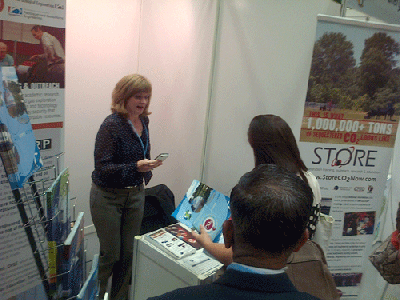 As the negotiations inch along towards agreement for a second Commitment Period for the Kyoto Protocol and for the Durban Platform for Enhanced Action (ADP) there is a realisation that although CCS negotiations have concluded, there has been a lot of other activity on CCS at this COP.
As the negotiations inch along towards agreement for a second Commitment Period for the Kyoto Protocol and for the Durban Platform for Enhanced Action (ADP) there is a realisation that although CCS negotiations have concluded, there has been a lot of other activity on CCS at this COP.
There are four 'official' UNFCCC Side-events on CCS and four 'unofficial' events. IEAGHG have presented or spoken at four so far, on Monday presenting our work on the Iron and Steel sector. By comparison at Durban there was only one 'official' Side-event on CCS (ours). Especially interesting at the Side-events here were the talks by Qatar, UAE and Saudi Arabia on their CCS project activities, with several pilot projects now in development in the region, supported by R&D programmes. Bio-CCS continues to gain prominence and interest, and the IEAGHG studies in this area are proving a valuable resource.
The need for information on CCS has been demonstrated both in the negotiations (eg where one negotiator questioned the basic risk, safety and uncertainty of CCS) and at the booths of CCS-related organisations which have been more popular than ever being visited by those seeking information on CCS. Also, there was a media-release here yesterday by seven green NGOs (ENGOs) who collaborated to produce a paper advocating actions to encourage CCS (see http://www.engonetwork.org ).
 Victoria Osbourne on the University of Texas/IEAGHG Stand
Victoria Osbourne on the University of Texas/IEAGHG Stand
The results of last week's negotiations on CCS were approved by SBSTA Plenary at 11:06pm on Saturday, and will go before CMP Plenary some time this Friday evening. Some observers are expressing dissappointment at the two CCS issues on transboundary and Global Reserve being deferred for four years, not realising that resolution of transboundary issues was always likely to take some time. For example, the London Convention, a large treaty which moves faster than UNFCCC because of its design and double pressure of ocean acidification as well as climate change, still took three years to reach a legal transboundary CCS amendment and another three years to make any further progress on the outstanding transboundary issues. The Global Reserve deferring is a different matter, there being no good arguments made for it now or to revive it in four years, but good arguments made for it to have been taken off the agenda now.
Ministers have now arrived, and the pressure is on to reach agreements before the COP concludes at the end of the week.


